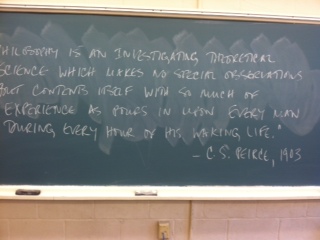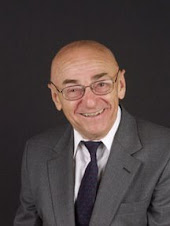We talked a bit on Opening Day, yesterday, about the relation between philosophy and religion. We'll continue that discussion all semester, along with the question of how philosophy relates to science and to everything else. As for science...
Every Opening Day every semester, it seems, I follow my colleague Mary into James Union Building Room 304 and find this on the board:
That’s
Charles Sanders Peirce, the “
pragmaticist” (“ugly enough to be safe from kidnappers”). In case you find either Mary or CSP (or both) difficult to decipher, here’s what he said… followed by what I think of what he said:
Philosophy is that branch of positive science (i.e., an investigating theoretical science which inquires what is the fact, in contradistinction to pure mathematics which merely seeks to know what follows from certain hypotheses) which makes no observations but contents itself with so much of experience as pours in upon every man during every hour of his waking life. CSP
I think Charles & Mary are on the right track, to call attention to everyday experience as the raw material of philosophy. Quotidian, commonplace, ordinary experiences and exceptional, rare, out-of-the-ordinary experiences happen to people. What has existence must have its reflective moment.
But, must philosophy aspire to the status of a
science? I say no. (Think of
Emerson, or for that matter
Emily Dickinson.) This may just be a semantic hairsplitting, depending on how much of the vast range of possible-plus-actual experience the “scientific philosopher” is prepared to reflect on, and how much she is prepared to jettison in the name of positivity.
My view: there are many diverse and legitimate forms of philosophical reflection. Some look less like science than like poetry. They all have their place.
And maybe Peirce thought so too. He definitely had his poetic/metaphysical flights:
agapism, cosmic love, firstness and secondness and
thirdness, his metaphorical likening of philosophy to an impassioned marriage (“The genuis of a man’s logical method should be loved and reverenced as his bride”-
Fixation of Belief 1877).
“It will be seen that pragmatism is not a Weltanschauung but is a method of reflexion having for its purpose to render ideas clear.” As James said: philosophy and metaphysics are just an “unusually obstinate attempt to think clearly.”
The consensus here is kind of Thoreauvian, isn’t it? “Simplify, simplify.” And how do you do that, in our discipline? Clarify, clarify. Science can help, and so can the poet.








 Charles Darwin (
Charles Darwin (











